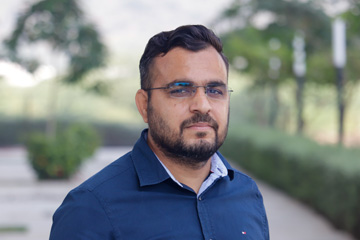Converting waste to fuel: way forward to a resilient planet
 Dr Lakhveer Singh, Assistant Professor, Department of Environmental Science published a book titled “Waste to Sustainable Energy: MFCs – Prospects through Prognosis”. This book has been featured in the list of Best Waste Management books of all time by CNN, Forbes, and Inc-Book Authority. The book has been awarded this stature by venerated reviewers of the International Expert Committee, as well as global leaders of the discipline.
Dr Lakhveer Singh, Assistant Professor, Department of Environmental Science published a book titled “Waste to Sustainable Energy: MFCs – Prospects through Prognosis”. This book has been featured in the list of Best Waste Management books of all time by CNN, Forbes, and Inc-Book Authority. The book has been awarded this stature by venerated reviewers of the International Expert Committee, as well as global leaders of the discipline.
A Microbial Fuel Cells (MFC) bio-refinery treat water using microorganisms and converts waste products and byproducts into fuel. This entails efficient waste management along with contributing to the generation of renewable fuel, and products that foster sustainable development. Addressing the present challenges in waste management, bioenergy, bioproduct recovery, and commercial sustainability, this book on MFCs emphasize on an array of mechanisms, routes, and reaction engineering approaches for extensive transformation of waste to wealth.
Extensive use of fossil fuels for energy emits carbon dioxide and other harmful gases adversely affecting the environment and leading to soaring global warming. Subsequently, domestic, agricultural waste products from animal facilities, refineries, and industries cause a tremendous environmental burden. Energy systems from MFCs enable the treatment and recycling of wastes, preventing environmental problems, and offsetting the pollution loads. Dr Lakhveer informs, “We are aiming at ensuring a sustainable and resilient environment that eliminates any potential odds of future climate change. Though globalization has preceded the escalation in production processes, a significant quantum of the waste materials generated through these practices can be transformed into fuels with the help of MFCs. Efficacies of this mechanism would ensure a paradigm shift built on the principles of sustainability.”
This book focuses on the MFCs with various combinations of substrates generating bioelectricity with valued co-products. Essentially, the book provides fundamental ideas on MFC technologies, entailing various design and modeling aspects with examples. Further, the book illustrates distinctive aspects of basic sciences, reactor configuration, application, and market feasibility of MFCs. Critically assessing the feasibility of waste-powered MFCs for sustainable bioenergy production, the book highlights the tradeoff between resource needs and energy production. The extensive research and details in the book will help academicians, entrepreneurs, and industrialists to understand the scope and challenges empowering them to select unique, and specific integrated approaches in unit processes.
Advancing his research to mitigate environmental issues, Dr Lakhveer will continue to explore bioenergy, water treatment, bioelectrochemical systems, and nanomaterial synthesis for energy and water applications, and bioreactors development. Also, he is presently editing two books that address several environmental challenges.

